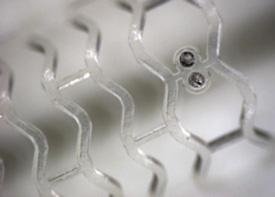
October 19, 2012 — Elixir Medical Corporation, a developer of products that combine state-of-the-art medical devices with advanced pharmaceuticals, announced six-month clinical, IVUS (Intravascular Ultrasound), OCT (Optical Coherence Tomography) and angiographic data for its 15-patient First-In-Man clinical study of the fully bioresorbable drug-eluting scaffold, the DESolve Bioresorbable Coronary Scaffold System at a late-breaking trial session of EuroPCR in Paris.
At six months, Elixir’s DESolve demonstrated excellent late lumen loss of 0.19 ± 0.19 mm, no reblockage of the artery (0.0% binary restenosis), no late malapposition (0.0 percent), low acute recoil (6.4 percent ± 4.3), no cases of blood clots (0.0 percent stent thrombosis) and a single MACE event due to a stenosis in the segment 5 mm proximal to the scaffold, which itself was widely patent. Imaging results also demonstrated low neointimal volume obstruction of 7.1 percent and no late recoil or scaffold shrinkage. OCT, which provides high resolution intravascular imaging, confirmed these results and showed that over 98 percent of the scaffold struts were covered with a thin, uniform neointimal layer (0.12 mm) at six months. The 15 patients were enrolled in Europe and New Zealand, and will continue to be followed-up at subsequent yearly intervals for 5 years.
“Bioresorbable scaffolds that restore the coronary vessel to its normal form and function without leaving a permanent implant in the body have long been considered the ultimate frontier in interventional cardiology,” said Stefan Verheye, M.D., Ph.D., ZNA Middleheim Hospital, Antwerp, Belgium, and principal investigator of the DESolve I Study, who presented the results at a Hot Line session. “Having used the DESolve bioresorbable scaffold system and observed its impressive performance and follow up results, I am confident that Elixir’s DESolve scaffold system has the potential to reduce long-term adverse clinical events, and eliminate the need for long-term dual anti-platelet therapy.”
“Elixir Medical is excited about the potential impact of this revolutionary technology on vascular intervention, and is committed to bringing DESolve to the market through evidence-based clinical research,” said Motasim Sirhan, chief executive officer of Elixir Medical. “In order to provide our physicians with unrivaled treatment options to improve patient outcomes, Elixir has ensured that DESolve will be available in a broad range of sizes, and that our manufacturing capacity is scalable for future studies and commercialization.”
To build upon the results of the DESolve FIM study, Elixir has initiated a pivotal trial, the DESolve Nx, which is currently enrolling 120 patients across Europe, New Zealand and Brazil. This trial will evaluate the safety and efficacy of Elixir’s DESolve Novolimus Eluting Bioresorbable Coronary Scaffold System with the primary safety endpoint being a composite of major adverse cardiac events (MACE). The primary angiographic endpoint of the trial will be in-stent late lumen loss at six months for all patients as assessed by QCA (Quantitative Coronary Angiography).
Bioresorbable scaffold technology had thus far been a challenge in the industry because it required a level of strength and support that only permanent metallic stents had been able to provide, the safe and gradual bioresorption of the strong scaffold once the blood vessel healed and could support itself, and the inclusion of an active pharmaceutical ingredient for its therapeutic, anti-proliferative effect. The DESolve scaffold made from a proprietary and proven poly-L Lactide (PLLA)-based polymer provides optimal strength and support to the artery while delivering an anti-proliferative drug, and is designed to resorb in the body within one to two years.
For more: www.elixirmedical.com


 January 05, 2026
January 05, 2026 









